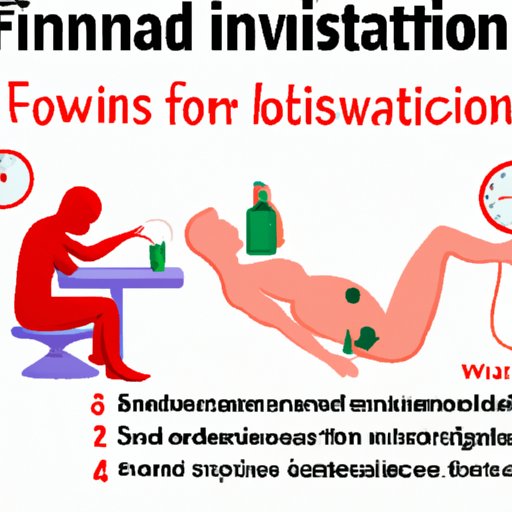I. Introduction to the article
Alcohol is a popular social lubricant consumed by people worldwide during social events, gatherings, and celebrations. While it can be an enjoyable substance, alcohol consumption can sometimes lead to undesirable effects on the body. In this article, we’ll delve into how long it takes for alcohol to kick in and the effects it can have on the body.
II. How Alcohol Works in the Body
When alcohol is consumed, it enters the body through the digestive system, absorbed mostly by the small intestine. It is then broken down in the liver by enzymes that transform it into energy, water, and carbon dioxide. Factors such as age, weight, and gender can affect how quickly the body absorbs alcohol.
Blood alcohol concentration (BAC) measures the amount of alcohol in the bloodstream. As BAC increases, so do the effects of alcohol on the body, including impaired coordination, slurred speech, and altered judgment.
III. The Timeline of Alcohol’s Effects on the Body
The effects of alcohol can start to be felt within minutes of consumption. After the first drink, alcohol begins to spread throughout the body, with the peak BAC level occurring around 30 minutes to an hour after consumption.
Continued consumption can lead to an increase in BAC, leading to various stages of intoxication. These different stages have varying symptoms, including increased heart rate, blurred vision, and loss of balance.
The effects of alcohol gradually subside as it is metabolized and eliminated from the body. The entire process can take several hours, depending on the amount of alcohol consumed and individual factors such as weight and metabolism.

IV. Drinking on an Empty Stomach: Fast Absorption
Drinking on an empty stomach can lead to faster absorption of alcohol, as it is not slowed down by food in the digestive system. This can result in higher BAC levels and a quicker onset of the effects of alcohol. However, this practice can be dangerous, as it can increase the risk of alcohol poisoning and other adverse effects.
V. Eating Before Drinking: Slowed Absorption
Eating before drinking can create a physical buffer in the stomach, slowing down the absorption of alcohol into the bloodstream. This can help to maintain lower BAC levels and slow down the onset of the effects of alcohol, minimizing adverse effects on the body.
Eating may also help to reduce the risk of dehydration, which can result from alcohol consumption.
VI. The Importance of Responsible Drinking Practices
Responsible drinking practices are crucial in ensuring the safety of individuals while consuming alcohol. Setting limits, pacing oneself while drinking, and staying hydrated can help to minimize the risks of adverse effects on the body.
Binge drinking and heavy alcohol consumption can have significant negative consequences on an individual’s life, affecting both physical and mental health. Practicing responsible drinking behaviors can help to avoid these risks.
VII. Risks and Dangers of Drinking Too Much
Excessive alcohol consumption can result in alcohol poisoning, which can be fatal. The effects of alcohol consumption go beyond physical health, impacting an individual’s judgment and decision-making abilities, leading to dangerous situations such as car accidents, falls, and other injuries.
Long-term heavy alcohol use can lead to various health issues, including liver disease, high blood pressure, and increased risks of cancer.
VIII. Tips and Advice for Managing Alcohol Consumption
Recognizing the warning signs of alcohol intoxication can help individuals to regulate their alcohol consumption and avoid adverse effects on the body. Tips for managing alcohol consumption include setting and sticking to limits, avoiding drinking games, and alternating alcoholic beverages with non-alcoholic ones.
Resources are available for individuals who want to seek help for alcohol abuse, including support groups, counseling, and medical intervention.
IX. Conclusion
Alcohol can have both positive and negative effects on the body, depending on individual factors and the amount consumed. Understanding the timeline of alcohol’s effects on the body and practicing responsible drinking habits can help individuals to avoid adverse effects and stay safe while enjoying the occasional drink.
Remember, always drink in moderation, know your limits, and practice responsible drinking habits.
